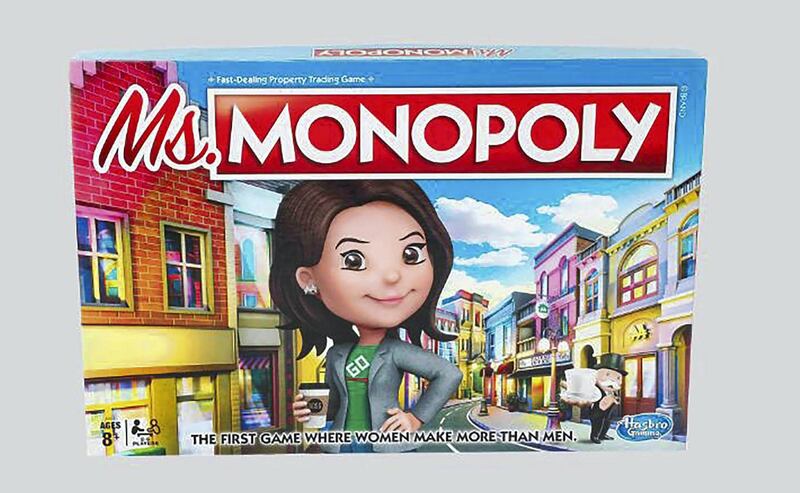Picture this: a dystopian reality in which women earn more than men. Women get paid $1,900 for every $1,500 earned by their male counterparts; you’re rewarded financially for watching a superhero movie helmed by an actress; and men are given bonuses for writing news articles about women.
No, this is not an antidote for Margaret Atwood's The Testament, nor a missing chapter from Naomi Alderman's feminist sci-fier The Power. It is the premise for new Hasbro game Ms Monopoly, "a fun take on the game that creates a world where women have an advantage often enjoyed by men", the creators have said.
How Ms Monopoly works
This version of the board game is fronted by a new character, the eponymous Ms Monopoly. The bob-haired, blazer-wearing, coffee-carrying businesswoman happens to be the niece of Rich Uncle Pennybags, the top-hat-wearing mustachioed gent who has been the face of the game for decades. Nepotism isn’t dead even in a fictional reality where women are on top, it seems.
“The Ms Monopoly game marks the first time in the franchise’s history where a new character will grace the cover, and while Mr Monopoly is a real-estate mogul, Ms Monopoly is an advocate whose mission is to invest in female entrepreneurs,” Hasbro further said in a statement.
It is also no longer about buying property, but making investments, and the “ground-breaking inventions and innovations made possible by women throughout history” are highlighted in the game. You don’t build houses or hotels in the modern reinvention; you create business headquarters.
The game also intends to address the gender pay gap, by offering women $240 just for passing go, while men are pegged to $200.
Here's where they got it wrong
Reading Twitter reactions — how does one form an opinion in 2019 without peering into that angry den? — the term “politically correct” had been hurled around en masse, as have accusations of liberal politics ruining a family game. It all feels like something Piers Morgan is going to get very angry about any minute now.
One 280-character commentator’s point stands out among the grumbles. “This is not equality and it’s undermining the women who fight for equality … this just makes people who fight for equality look stupid.” Another adds: "This is ridiculous it doesn't promote equality. It promotes special treatment. Women can win Monopoly without having to be catered to."
I'm inclined to agree. Without leaning too much into the opinion of the keyboard warrior who wrote: “If this was other way around, everyone would go mad, so why is it okay to do it for women?” He is also right.
The actual game of Monopoly has never been about a gendered playing field. Not once during a family games night was I dealt $0.79 for every $1 my brother earned — the fact that he used to steal directly from the bank when he thought no one was looking was another problem entirely, but I digress.
Offering women $40 extra just for passing go doesn't help anyone in the long run. I loved indulging a world where women have a physical upper hand in The Power, along with the detailed fictional analysis of the flipped gender dynamics. But "the first game where women make more than men" doesn't do anything for a gender pay gap. If anything, it feels patronising.
There are things I like about the game, don’t get me wrong; the fact that it has highlighted the female-lead role in the invention and creation of everything from Wi-Fi to solar heating and bulletproof vests, is fantastic. But overall Ms Monopoly falls flat and feels tone-deaf.
The ironic history of Monopoly
There is also an enormous irony in a game that celebrates female inventions, but completely ignores that it, itself, was one.
Mary Pilon's The Monopolists explains that in 1904 "a forgotten feminist named Lizzie Magie who invented her nearly identical Landlord's Game" — her early version of the game was created to spread the word of economist Henry George.
Thirty years later, Charles Darrow took credit for the game, patented it as Monopoly and went on make his millions off the board. By 1935, he had made minor changes to Landlord's Game and sold Monopoly to the Parker Brothers, the toy and game manufacturer which went on to become Hasbro.
Naturally, Hasbro maintains that the game we play today is a direct result of Darrow’s pre-Second World War creation. But leaving Magie out of the narrative completely doesn’t really play the game, does it Ms Monopoly?
I think I speak on behalf of women everywhere when I say we’d much rather an extra $0.21 was found to match the male $1 globally. You can keep your extra Monopoly money, thanks.







